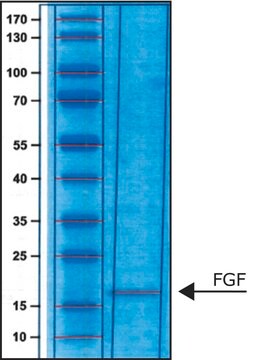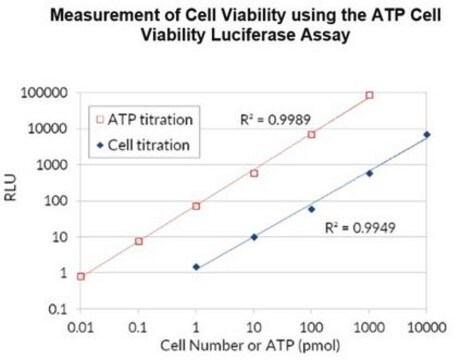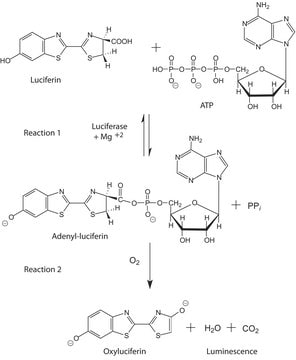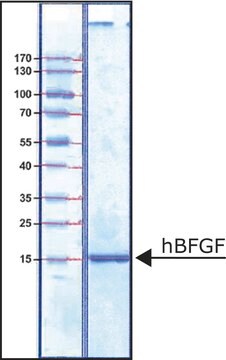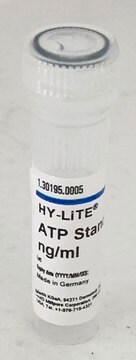FLAA
Adenosine 5′-triphosphate (ATP) Bioluminescent Assay Kit
for ATP quantitation
Sinónimos:
ATP Bioluminescence Assay, ATP Determination Kit, Luminescent ATP Detection kit
Iniciar sesiónpara Ver la Fijación de precios por contrato y de la organización
About This Item
Productos recomendados
Nivel de calidad
temp. de almacenamiento
−20°C
Descripción general
The Adenosine 5′-triphosphate (ATP) Bioluminescent Assay Kit may be employed for the quantitative bioluminescent determination of ATP in samples. ATP is consumed and light is emitted when luciferase catalyzes the oxidation of D-luciferin. When ATP is the limiting reagent, the light emitted is proportional to the ATP present in the sample.
Aplicación
Adenosine 5′-triphosphate (ATP) Bioluminescent Assay Kit has also been used in the quantification of ATP in 3D matrixes of human neurons, hepatic cells with ischemia, various bacterial cultures and lysosomes.
Solo componentes del kit
Referencia del producto
Descripción
- FL-AAB Dilution buffer 1 mL/vial
- FL-AAM Assay mix 1 mL/vial
- FL-AAS ATP standard 1 mL/vial
Palabra de señalización
Danger
Frases de peligro
Consejos de prudencia
Clasificaciones de peligro
Eye Dam. 1
Código de clase de almacenamiento
10 - Combustible liquids
Certificados de análisis (COA)
Busque Certificados de análisis (COA) introduciendo el número de lote del producto. Los números de lote se encuentran en la etiqueta del producto después de las palabras «Lot» o «Batch»
¿Ya tiene este producto?
Encuentre la documentación para los productos que ha comprado recientemente en la Biblioteca de documentos.
Los clientes también vieron
Hynek Mergental et al.
Liver transplantation : official publication of the American Association for the Study of Liver Diseases and the International Liver Transplantation Society, 24(10), 1453-1469 (2018-10-26)
Increased use of high-risk allografts is critical to meet the demand for liver transplantation. We aimed to identify criteria predicting viability of organs, currently declined for clinical transplantation, using functional assessment during normothermic machine perfusion (NMP). Twelve discarded human livers
F Chen et al.
Journal of clinical microbiology, 32(11), 2791-2800 (1994-11-01)
A bioluminescent assay which employs the luciferin-luciferase ATP-dependent reaction was used to evaluate the viability of populations of Pneumocystis carinii derived from infected rat lungs. Contamination with host cells was reduced by a purification method which involved a combination of
Marco A Tavares et al.
Environmental toxicology and pharmacology, 40(1), 206-214 (2015-07-06)
Fipronil is an insecticide extensively used to control pests in crops and animals. There are relates of poisoning due to exposure of fipronil in mammals and the liver has been suggested as potential target. In this study, we evaluated the
John F C Steele et al.
PloS one, 14(8), e0221226-e0221226 (2019-08-29)
Plant NLRs are modular immune receptors that trigger rapid cell death in response to attempted infection by pathogens. A highly conserved nucleotide-binding domain shared with APAF-1, various R-proteins and CED-4 (NB-ARC domain) is proposed to act as a molecular switch
Daniel Nicodemo et al.
Journal of economic entomology, 111(3), 1369-1375 (2018-03-14)
Silkworm cocoon production has been reduced due to a number of problems other than those inherent in sericulture, such as diseases, malnutrition, and inappropriate management. The use of pesticides in areas surrounding mulberry fields can contaminate these plants and consequently
Nuestro equipo de científicos tiene experiencia en todas las áreas de investigación: Ciencias de la vida, Ciencia de los materiales, Síntesis química, Cromatografía, Analítica y muchas otras.
Póngase en contacto con el Servicio técnico


